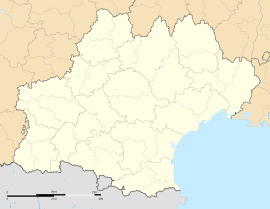Milhaud facts for kids
Quick facts for kids
Milhaud
|
||
|---|---|---|
|
||
| Country | France | |
| Region | Occitanie | |
| Department | Gard | |
| Arrondissement | Nîmes | |
| Canton | La Vistrenque | |
| Intercommunality | Nîmes Métropole | |
| Area
1
|
18.25 km2 (7.05 sq mi) | |
| Population
(2008)
|
5,611 | |
| • Density | 307.45/km2 (796.30/sq mi) | |
| Time zone | UTC+01:00 (CET) | |
| • Summer (DST) | UTC+02:00 (CEST) | |
| INSEE/Postal code |
30169 /30540
|
|
| Elevation | 15–122 m (49–400 ft) (avg. 32 m or 105 ft) |
|
| 1 French Land Register data, which excludes lakes, ponds, glaciers > 1 km2 (0.386 sq mi or 247 acres) and river estuaries. | ||
Milhaud is a small town, also known as a commune, located in the Gard department in southern France. It's a charming place with a rich history and a friendly community. The town is part of the Occitanie region, which is known for its beautiful landscapes and Mediterranean climate.
Milhaud is situated not far from the larger city of Nîmes. It offers a peaceful lifestyle while still being close to bigger urban centers. The town's name might make you think of the famous composer Darius Milhaud, but this article is about the town itself.
Contents
Geography of Milhaud
Milhaud is located in a lovely part of France. The town sits at an average height of 32 meters (about 105 feet) above sea level. Its lowest point is 15 meters (49 feet), and its highest point reaches 122 meters (400 feet). This difference in height means the area has some gentle hills and valleys.
Location and Surroundings
The commune covers an area of about 18.25 square kilometers (about 7 square miles). It is surrounded by beautiful French countryside. The climate here is typically Mediterranean, meaning it has warm, dry summers and mild, wet winters. This kind of weather is great for growing olives and grapes.
Nearby Cities
Milhaud is part of the Nîmes Métropole, which is a group of towns and cities around Nîmes. This connection helps Milhaud share resources and services with its neighbors. Being close to Nîmes means residents can easily access bigger shops, hospitals, and cultural attractions.
People and Government
As of 2008, Milhaud had a population of 5,611 people. The number of people living in a commune can change over time. The people who live in Milhaud are called Milhaudois.
Local Leadership
Like all communes in France, Milhaud has a mayor and a local council. The mayor is in charge of running the town's daily affairs. From 2008 to 2014, the mayor of Milhaud was Jean-Michel Avellaneda. The mayor and the council work together to make decisions that benefit the community. This includes managing local services like schools, roads, and public spaces.
Community Life
Life in Milhaud often revolves around local events and traditions. Many French communes have a strong sense of community. People often gather for markets, festivals, and other celebrations. These events help bring people together and keep local culture alive.
History of Milhaud
The area around Milhaud has been inhabited for a very long time. Like many places in southern France, it has a history that stretches back to Roman times. The Romans had a strong presence in this region, building roads and cities.
Historical Significance
Over the centuries, Milhaud would have seen many changes. It would have been influenced by different rulers and historical events. The old buildings and streets in the town often tell stories of its past. Exploring the town can feel like a journey through time.
Economy and Lifestyle
The economy of Milhaud, like many small French towns, is often based on a mix of agriculture, local businesses, and services. The fertile land in the region supports farming.
Local Businesses
Small shops, cafes, and restaurants are important for the town's economy. They provide jobs for local people and places for residents to gather. Many people living in Milhaud might also work in nearby larger cities like Nîmes.
Quality of Life
Milhaud offers a quiet and pleasant lifestyle. It's a place where people can enjoy the outdoors and the slower pace of life. The town provides essential services for its residents, making it a comfortable place to live and grow up.
See also
 In Spanish: Darius Milhaud para niños
In Spanish: Darius Milhaud para niños
 | Jewel Prestage |
 | Ella Baker |
 | Fannie Lou Hamer |




